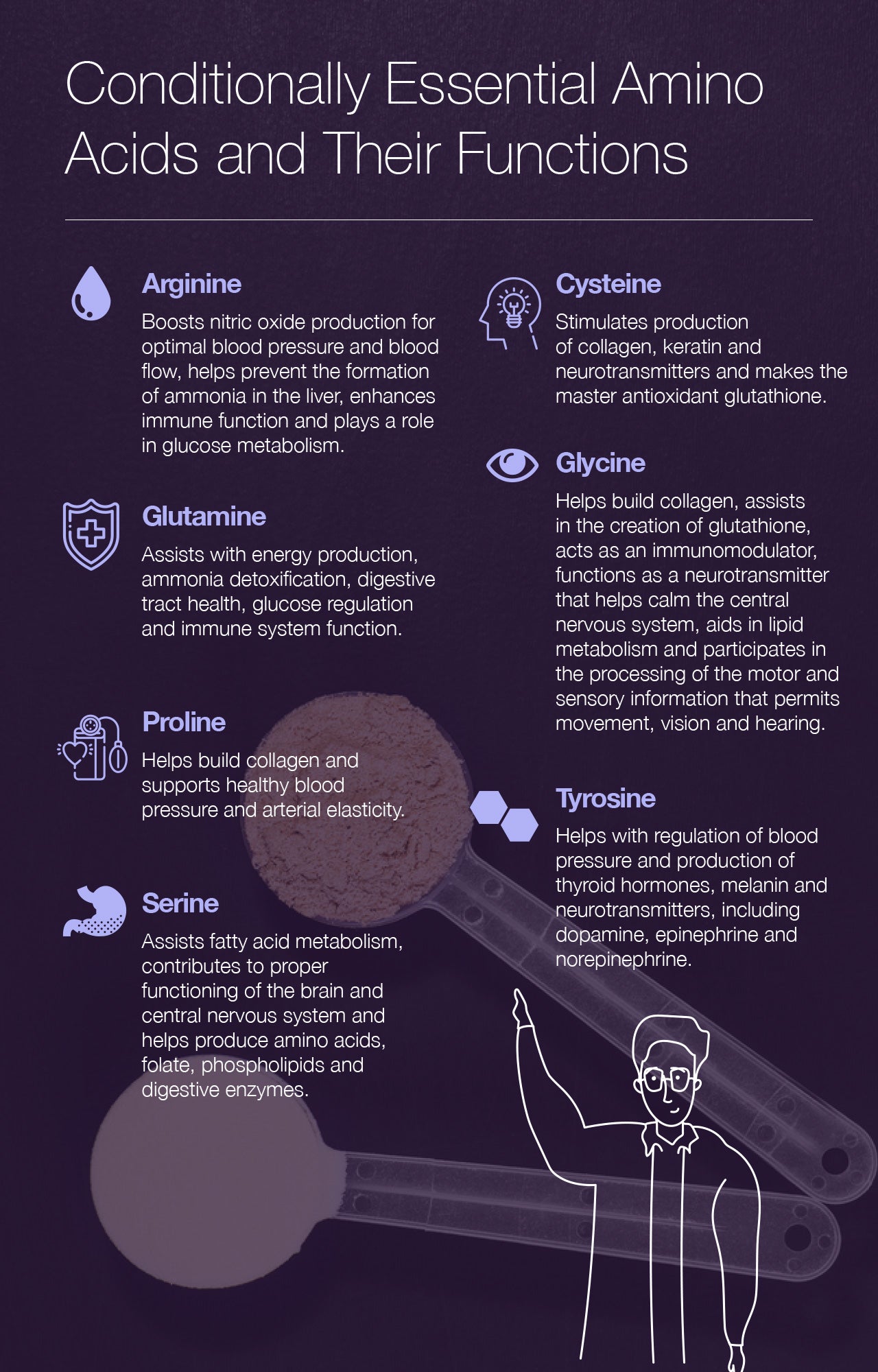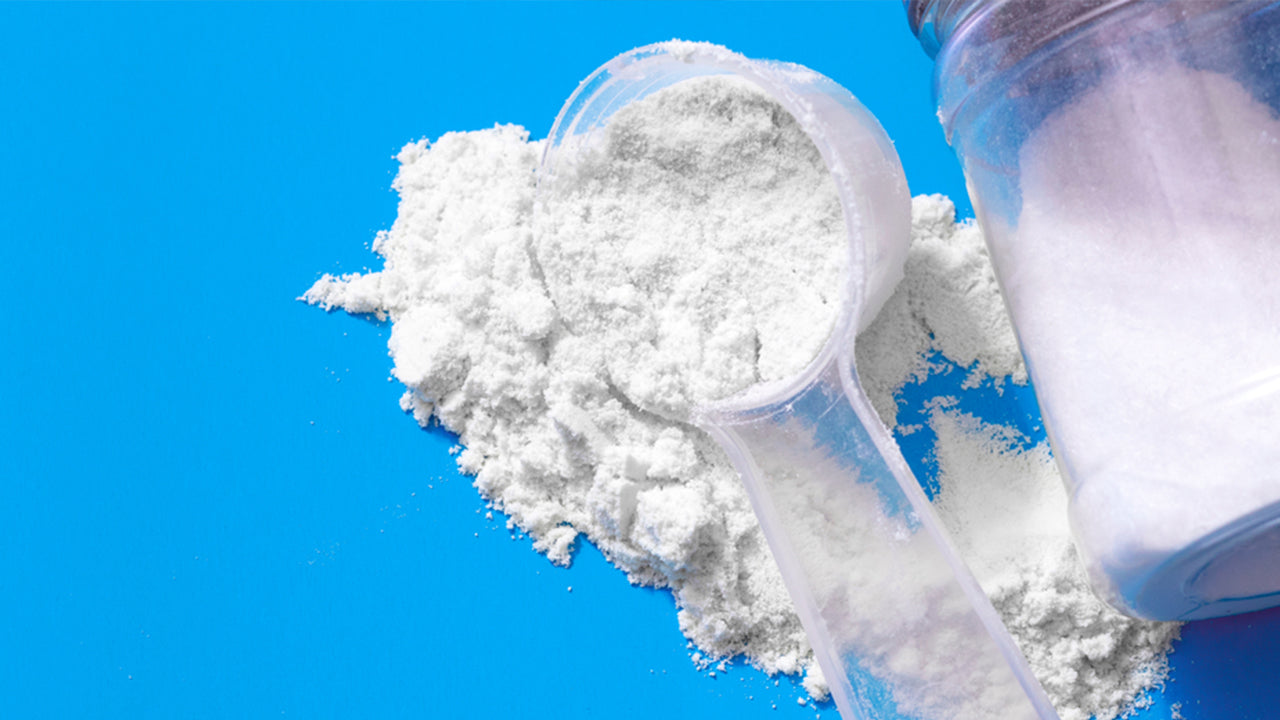The Low-Down on Conditionally Essential Amino Acids
 By: by Amino Science
By: by Amino Science

Amino acids are the building blocks of life. Without them, our bodies couldn’t create the various and sundry proteins that help us build our muscles, balance our blood sugar, and manufacture the neurotransmitters that allow our brains to function. Some of these amino acids are considered nonessential because our bodies can make them on their own, and some are considered essential because we must get them from the foods we eat. And then there are the branched-chain amino acids, or BCAAs, which are a subgroup of the essential amino acids. But what about the so-called conditionally essential amino acids?
In this article, we’re going to explore this special group of amino acids and uncover everything you need to know about who they are, what they do, and why they’re important to overall health.
What Are Conditionally Essential Amino Acids?
Of the over 300 different amino acids known to science, 20 are used by the human body to create the proteins required for life. Eleven of these 20 amino acids are nonessential, and 9 are essential. For reference purposes, the nine essential amino acids are:
- Histidine
- Isoleucine
- Leucine
- Lysine
- Methionine
- Phenylalanine
- Threonine
- Tryptophan
- Valine
By contrast, the 11 nonessential amino acids are:
- Alanine
- Arginine
- Asparagine
- Aspartic acid (aspartate)
- Cysteine
- Glutamic acid (glutamate)
- Glutamine
- Glycine
- Proline
- Serine
- Tyrosine
It’s actually among the nonessential amino acids that we find the conditionally essential amino acids, or conditional amino acids, as they’re sometimes called. Like the other nonessential amino acids, the conditionally essential amino acids are also produced in the body—that is, under normal circumstances.
However, when the body is overwhelmed by severe stress, illness, or injury, it can start to have trouble creating sufficient amounts of certain nonessential amino acids. And when this happens, these amino acids can enter essential territory—hence, the term conditionally essential.
The 7 Conditionally Essential Amino Acids
There are seven nonessential amino acids that sometimes become conditionally essential. These are:
- Arginine
- Cysteine
- Glutamine
- Glycine
- Proline
- Serine
- Tyrosine
Arginine
Arginine is perhaps best known for its ability to increase production of the important vasodilator nitric oxide, which improves blood flow and reduces blood pressure. Because of its role in boosting nitric oxide production, arginine is a key player in heart health and can be useful in treating hypertension, angina, circulatory diseases, and erectile dysfunction.
Arginine also helps prevent the formation of ammonia in the liver, enhances immune function, and aids in glucose metabolism, making it potentially useful for people suffering from diabetes.
However, certain catabolic conditions—those that lead to the breakdown of protein—may necessitate dietary supplementation of arginine.
Preterm infants, for example, can’t make arginine on their own. The aging process also results in less efficient production of arginine. And people with serious wounds and burns may need the added support of dietary arginine to assist with the healing process.
Good dietary protein sources of arginine include:
- Meat
- Poultry
- Dairy products
- Soybeans
- Chickpeas
- Spirulina
- Nuts
- Seeds
Cysteine
Cysteine is a sulfur-containing amino acid that helps give proteins their structure. It’s abundant in keratin, the main structural protein in nails, skin, and hair. Cysteine also plays an important role in detoxification, neurotransmitter production, and collagen formation.
In addition, cysteine is a precursor of the amino acid taurine, which plays a significant part in heart health, insulin sensitivity, electrolyte balance, hearing, and immune system regulation.
Moreover, cysteine works with the amino acids glutamic acid and glycine to produce glutathione—the body’s master antioxidant. Glutathione is particularly important for the body’s detoxification process and is thought to help mitigate hangover symptoms and liver damage due to excessive alcohol consumption.
Cysteine is so important for liver health that its precursor (and supplement form), N-acetylcysteine (NAC), is used in hospitals to prevent liver damage caused by acetaminophen overdose. NAC also supports respiratory health and has been shown in studies to decrease exacerbations of both chronic bronchitis and chronic obstructive pulmonary disease (COPD).
If the body is able to maintain adequate levels of the amino acids methionine and serine, cysteine levels should remain stable. However, infants, older adults, and people dealing with metabolic or malabsorption syndromes may require supplementation.
Good protein sources of cysteine are:
- Meat
- Poultry
- Fish
- Eggs
- Yogurt
- Soybeans
- Oatmeal
- Sunflower seeds
Glutamine
Glutamine is important for a variety of functions, including protein synthesis, energy production, ammonia detoxification, digestive tract health, glucose regulation, and immune system function.
Glutamine supplements are particularly popular among exercise enthusiasts, as some studies have found that glutamine can decrease muscle soreness and enhance recovery. Glutamine is normally the most abundant free amino acid in skeletal muscle, and depletion of muscle glutamine is an indicator of “overtraining syndrome.”
Muscle glutamine depletion is also the hallmark of the muscle wasting seen in critical illness, and people suffering from severe injury or illness may find that the body’s requirements for glutamine exceed its ability to produce sufficient levels of this important amino acid on its own.
Unfortunately, increasing consumption of glutamine may not readily reverse glutamine depletion in muscle tissue since the exhaustion of glutamine arises from a metabolic response that tends to keep glutamine out of muscle even when extra protein intake is supplied by the diet.
Quality protein sources of glutamine include:
- Meat
- Seafood
- Eggs
- Dairy products
- Beans
- Cabbage
- Nuts
Glycine
Glycine is the most abundant amino acid in collagen, accounting for one third of the amino acids present. Glycine also helps the body make glutathione and acts as an immunomodulator.
In addition, glycine functions as a neurotransmitter, helps calm the central nervous system, and participates in the processing of the motor and sensory information that permits movement, vision, and hearing.
Moreover, glycine is the second most common amino acid in body proteins and helps break down ingested fats by regulating the secretion of bile acids from the gallbladder into the small intestine.
Like glutamine, glycine is also a glucogenic amino acid, which means it can be converted into glucose by the liver. Glucose is the brain’s energy source, and even a transient dip can result in a drop in brain function, so this ability to help support consistent blood glucose levels is extremely important.
Similar to other conditionally essential amino acids, the body’s ability to produce glycine may become compromised during times of stress, injury, or illness.
The main food sources of glycine are animal proteins and include:
- Meat
- Poultry
- Gelatin
- Egg whites
Proline
Proline plays an important role in cellular regeneration and tissue repair. Like glycine, proline is also a component of collagen and helps support healthy blood pressure and arterial elasticity, thus decreasing the risk of arteriosclerosis.
Under normal conditions, the body uses glutamic acid to synthesize proline. However, severe stress, such as that seen with burns and other injuries—even endurance exercise—can cause proline to become conditionally essential.
Dietary protein sources of proline include:
- Meat
- Poultry
- Dairy products
- Gelatin
- Egg whites
- Soybeans
Serine
Serine, which can be synthesized in the body from both glycine and threonine, is a key player in metabolism and helps produce several types of molecules as well as other amino acids and folate.
Serine is also required for fatty acid metabolism and is an important structural component of trypsin and chymotrypsin—two major digestive enzymes our bodies use to break down the protein in the foods we eat. Cell membranes rely on serine as well, as it’s incorporated into the phospholipids that surround and protect the cells.
In addition, serine is essential for appropriate physical and mental functioning, but it’s especially important for proper functioning of the brain and central nervous system. Some studies have even found a link between serine deficiency and schizophrenia, amyotrophic lateral sclerosis (ALS), fibromyalgia, chronic fatigue syndrome, Parkinson’s disease, and Alzheimer’s disease.
While serine deficiency is rare, some people are born with disorders of amino acid metabolism that affect their ability to synthesize serine. These enzyme defects can result in severe neurological consequences, including microcephaly, psychomotor retardation, and intractable seizures.
Good dietary protein sources of serine are:
- Meat
- Shellfish
- Eggs
- Soybeans
- Peanuts
- Almonds
- Chickpeas
Tyrosine
Tyrosine plays a role in protein synthesis and is involved in regulation of blood pressure as well as production of thyroid hormones, melanin, and a number of brain chemicals that affect mood, focus, and other aspects of cognitive function. Some of these important neurotransmitters include dopamine, epinephrine, and norepinephrine.
Because tyrosine is made from phenylalanine and is thus dependent on dietary protein to ensure sufficient levels of this essential amino acid, a deficiency in phenylalanine can cause a deficiency in tyrosine as well.
Moreover, people born with phenylketonuria (PKU)—a disorder of amino acid metabolism—must limit their consumption of foods containing phenylalanine. This may consequently lead to increased amino acid requirements that necessitate the use of supplemental tyrosine to prevent deficiency.
Tyrosine can be obtained from a number of both animal and plant proteins, including:
- Poultry
- Fish
- Dairy products
- Soybeans
- Pumpkin seeds
- Avocados
- Bananas
- Almonds

And there you have it. The nonessential amino acids that may just slip into conditional territory in times of injury, illness, or stress. The best way to make sure your amino acid needs are met? A balanced, protein-rich diet with an essential amino acid supplement to shore up any gaps in protein nutrition!

Up to 25% off Amino
Shop NowTAGS: knowledge
Join the Community
Comments (0)
Most Craveable Recipes




 833-264-6620
833-264-6620



















